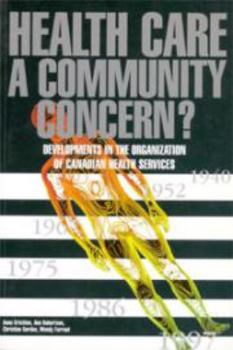Health Care a Community Concern?: Developments in the Organization of Canadian Health Services
Developed within the context of the expansion of the Canadian welfare state in the years following the Great Depression, the present organization of Canadian health care delivery is now in serious need of reform. This book documents the causes and effects of changes made in this century to Canada's health care policy. Particular emphasis is placed on the decades following 1940, the years in which Canada moved away from an individualistic entrepreneurial medical care system, first toward a collectivist biomedical model and then to a social model for health care. The changing roles of federal, provincial, and municipal government are explored, as are recent trends away from crisis-oriented health care toward an approach that stresses promotion of health. The authors argue that the original collectivist model restricted community members from participation in the decision-making process. Leaving health policy decisions in the hands of politicians and bureaucrats has led to a system that is poorly coordinated and often poorly managed. They propose a shift away from the "welfare state" model toward what has been called the "welfare society," in which there is greater participation of individuals and communities. They advocate partnership with business and research communities and reform and restructuring through regionalization.
Format:Paperback
Language:English
ISBN:1895176840
ISBN13:9781895176841
Release Date:April 1997
Publisher:University of Calgary Press
Length:432 Pages
Weight:1.27 lbs.
Dimensions:0.9" x 6.0" x 9.0"
Customer Reviews
0 rating





